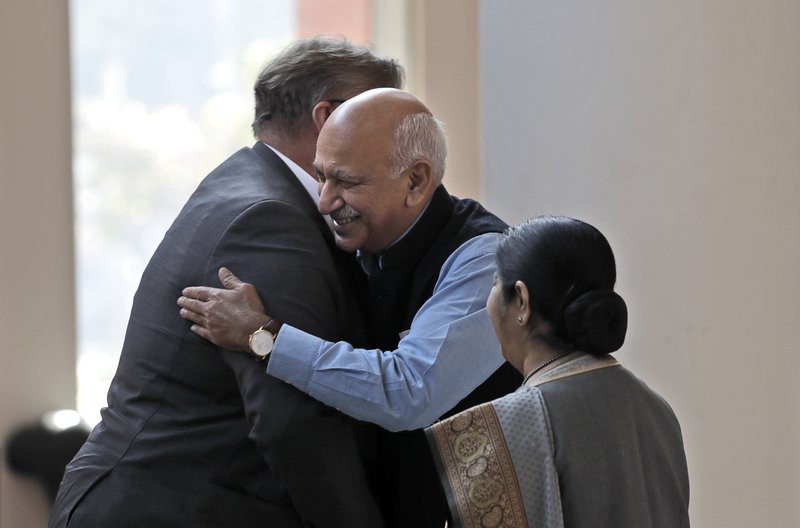NEW DELHI -- M.J. Akbar, India's junior external affairs minister, resigned Wednesday amid accusations by 20 women of sexual harassment during his previous career as one of the country's most prominent news editors, becoming the most powerful man to fall in India's burgeoning #MeToo movement.
Akbar said in a statement that he would "challenge false accusations" in a personal capacity, referring to a criminal case he filed Monday against the first woman to accuse him.
Akbar, 67, first served as a lawmaker for India's then-ruling India National Congress party between 1989 and 1991. He then edited The Telegraph, The Asian Age and other newspapers and wrote several books of nonfiction, becoming one of the most influential people in the Indian news media.
He returned to public life in March 2014, when he joined the Bharatiya Janata Party and was appointed national spokesman during the 2014 election that brought the party and Prime Minister Narendra Modi to power.
Akbar maintained a low profile after joining India's Ministry of External Affairs in July 2016 as its junior minister, representing India overseas at multinational conferences.
On Wednesday he thanked Modi, who had remained silent about the allegations, for the opportunity to serve in public office.
In India's deeply conservative society, the #MeToo movement began belatedly but has picked up steam in recent weeks. Since September, Indian actresses and writers have flooded social media with allegations of sexual harassment and assault by their superiors and colleagues.
The string of accusations against Akbar began when journalist Priya Ramani identified him on Twitter on Oct. 8 as the unnamed editor that she had described in a story about newsroom sexual harassment published in Vogue last year.
Other women in media have alleged that Akbar interviewed job candidates in hotel rooms at night; groped, massaged and forcibly kissed young interns and employees; and offered young women choice out-of-town postings so that he could go visit them there.
On Sunday, returning from an official visit to West Africa, Akbar denied the allegations as "false, baseless and wild."
The next day, dozens of members of the Congress Party's youth wing clashed with police outside Akbar's New Delhi home, demanding his resignation.
Akbar then filed a criminal case against Ramani and released a statement in which he questioned his accusers' motives.
"Why has this storm risen a few months before a general election?" he asked.
Modi is hoping to remain in power in elections due early next year.
On Tuesday, 20 women signed a statement asking the court hearing Akbar's case against Ramani to allow them to testify against him.
Ramani wrote Wednesday on Twitter: "As women we feel vindicated by MJ Akbar's resignation. I look forward to the day when I will also get justice in court #MeToo."
Arti Jerath, a journalist and political commentator who is not among Akbar's accusers, said his resignation should have come earlier.
"The fact that he chose to brazen it out, he became an embarrassment to himself and an embarrassment to the government," she said. "I am glad that he is finally gone."
A Section on 10/18/2018
